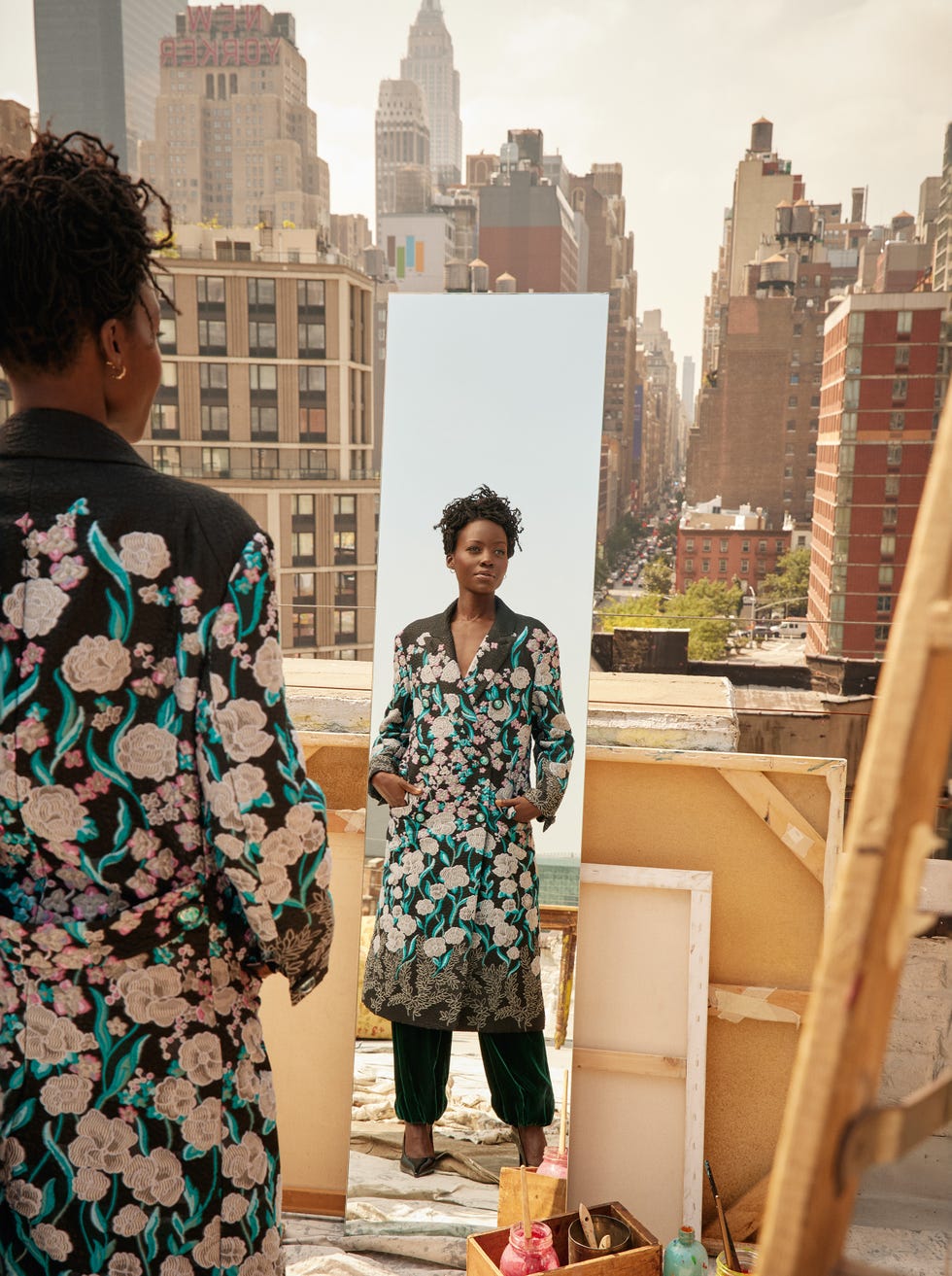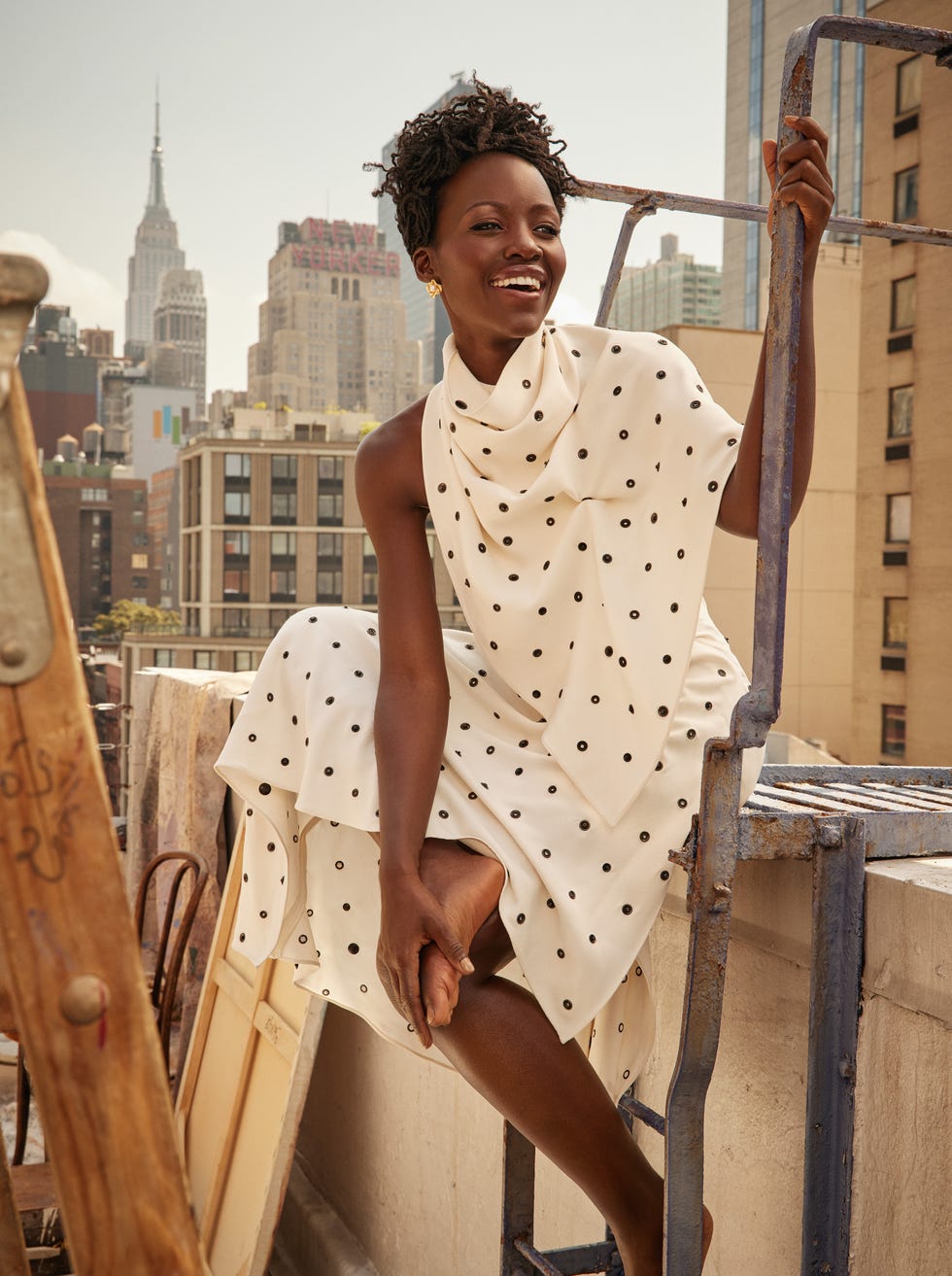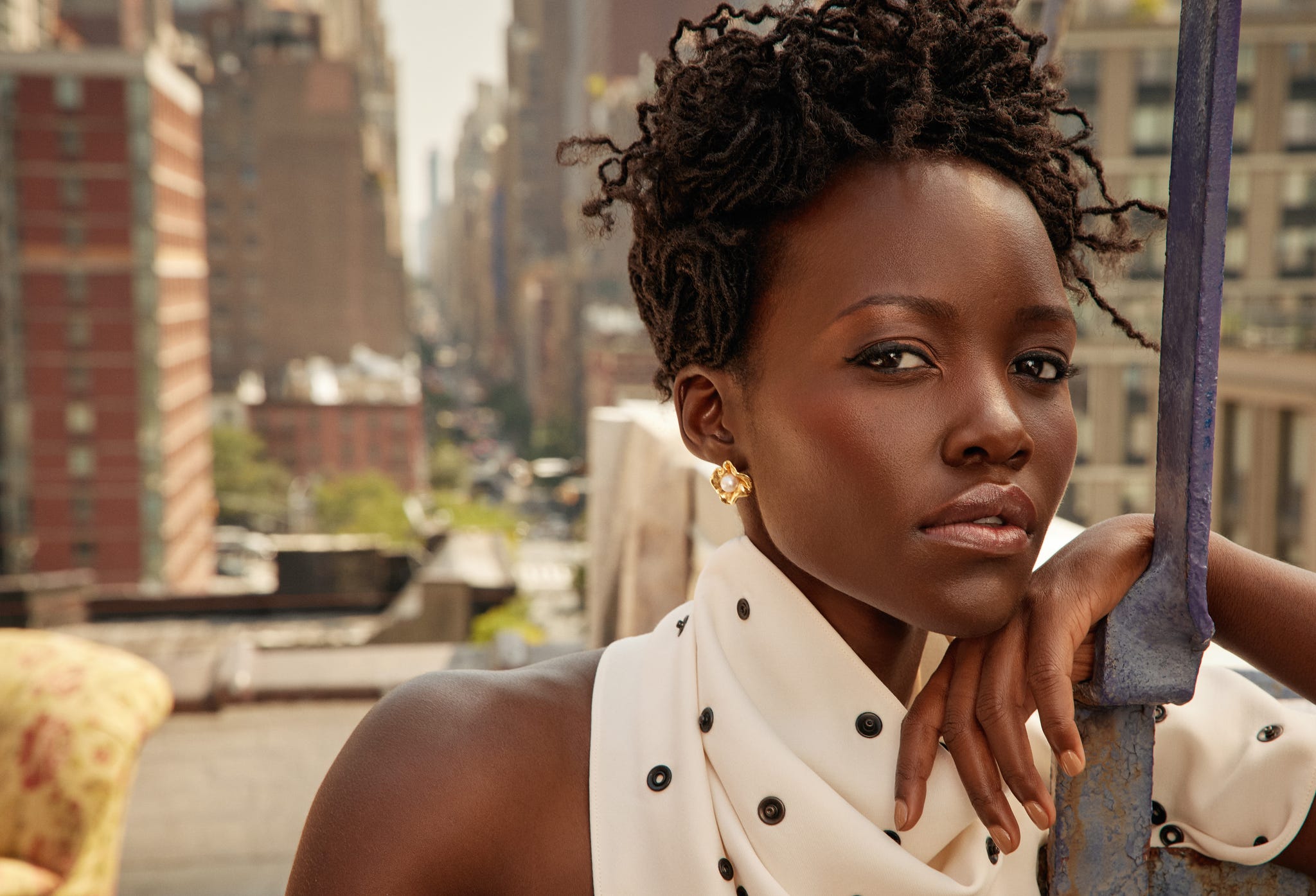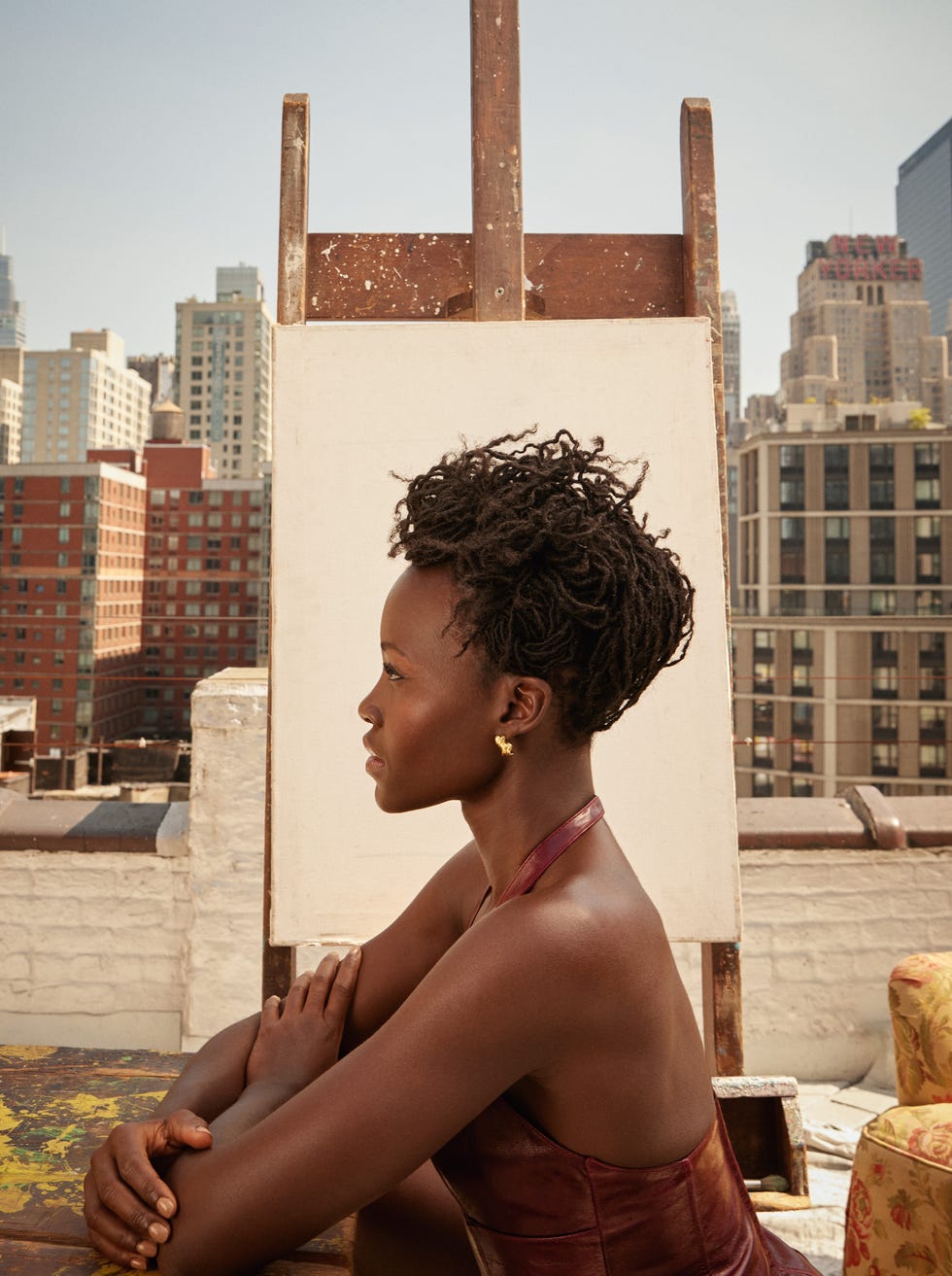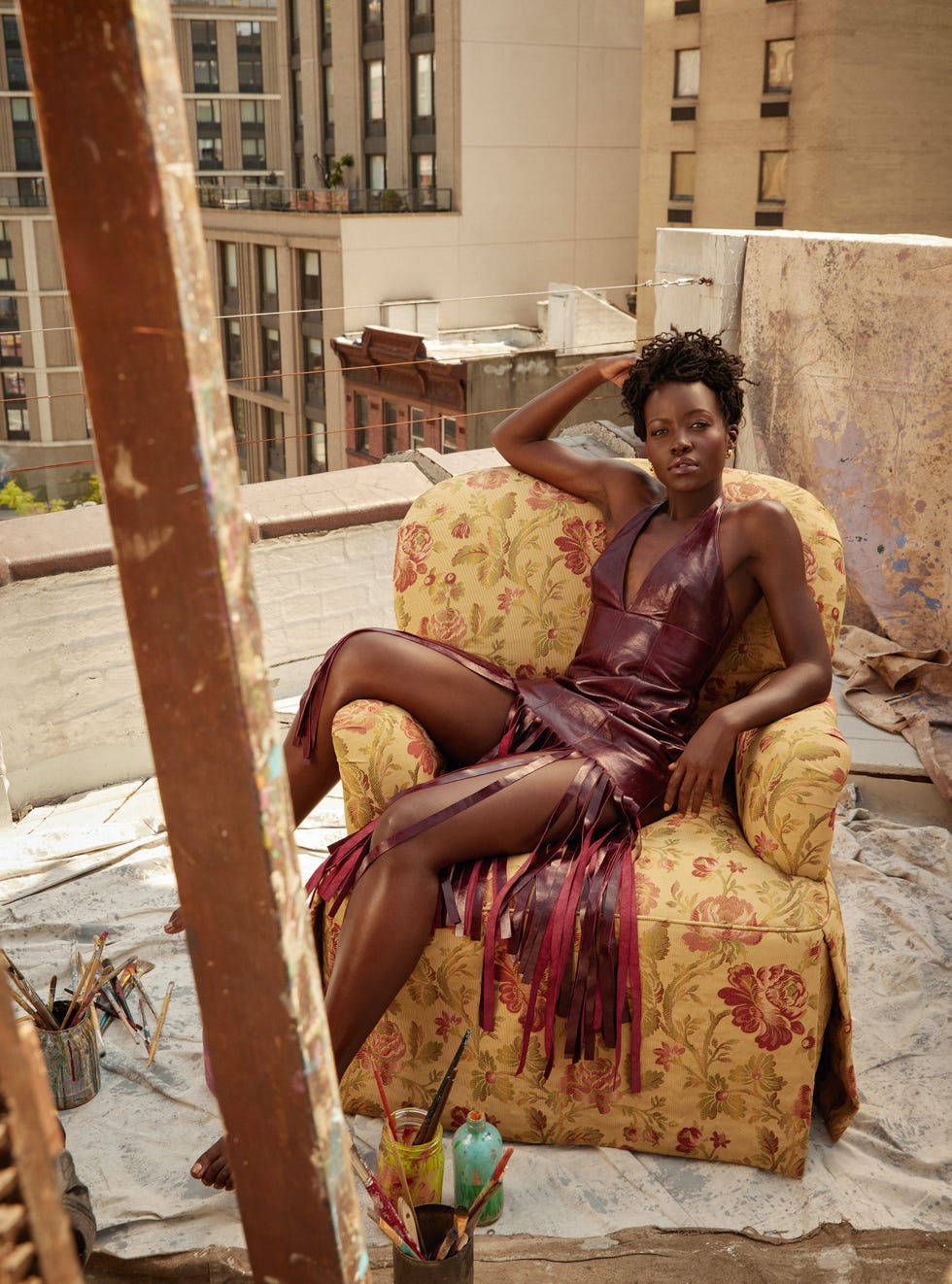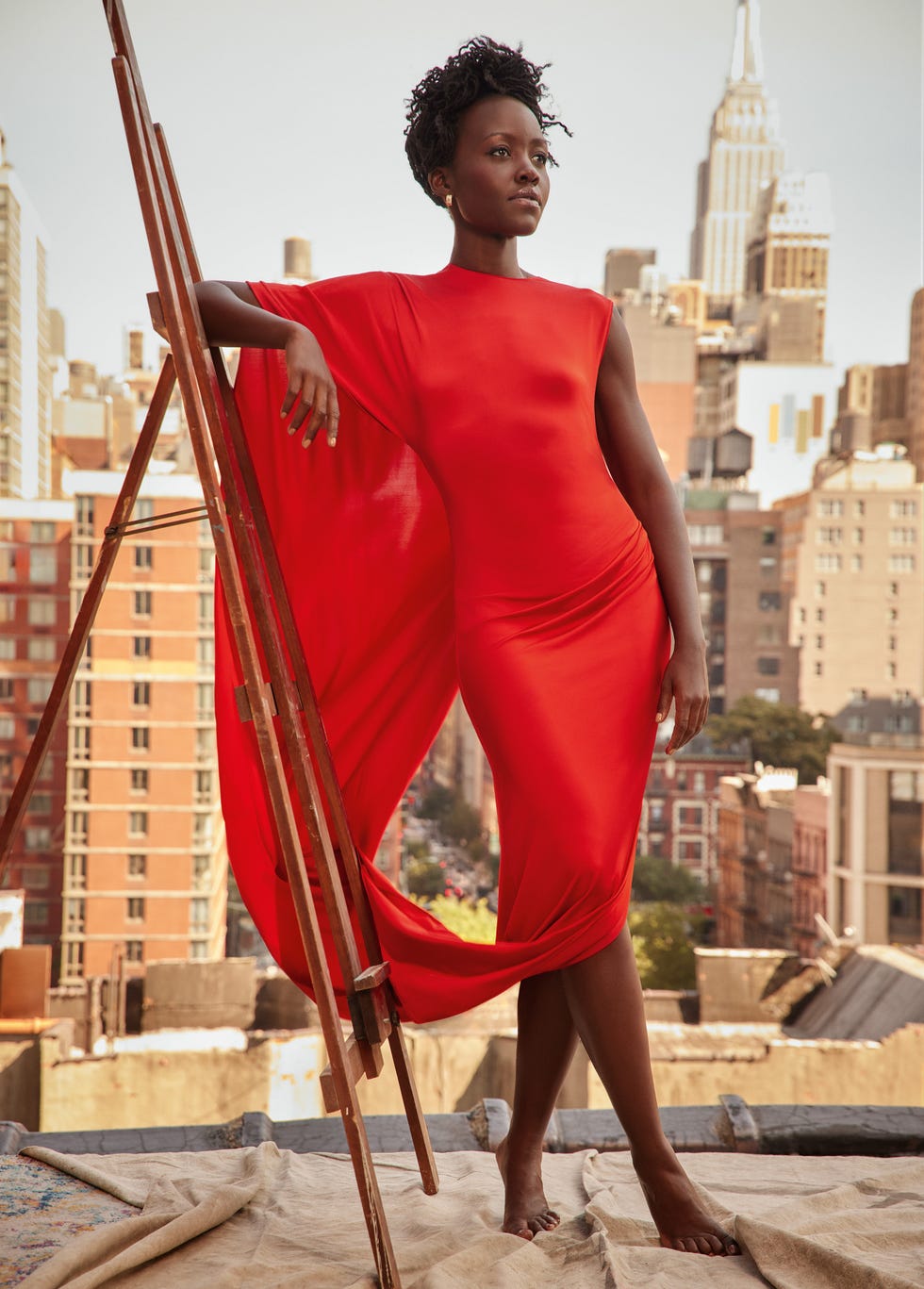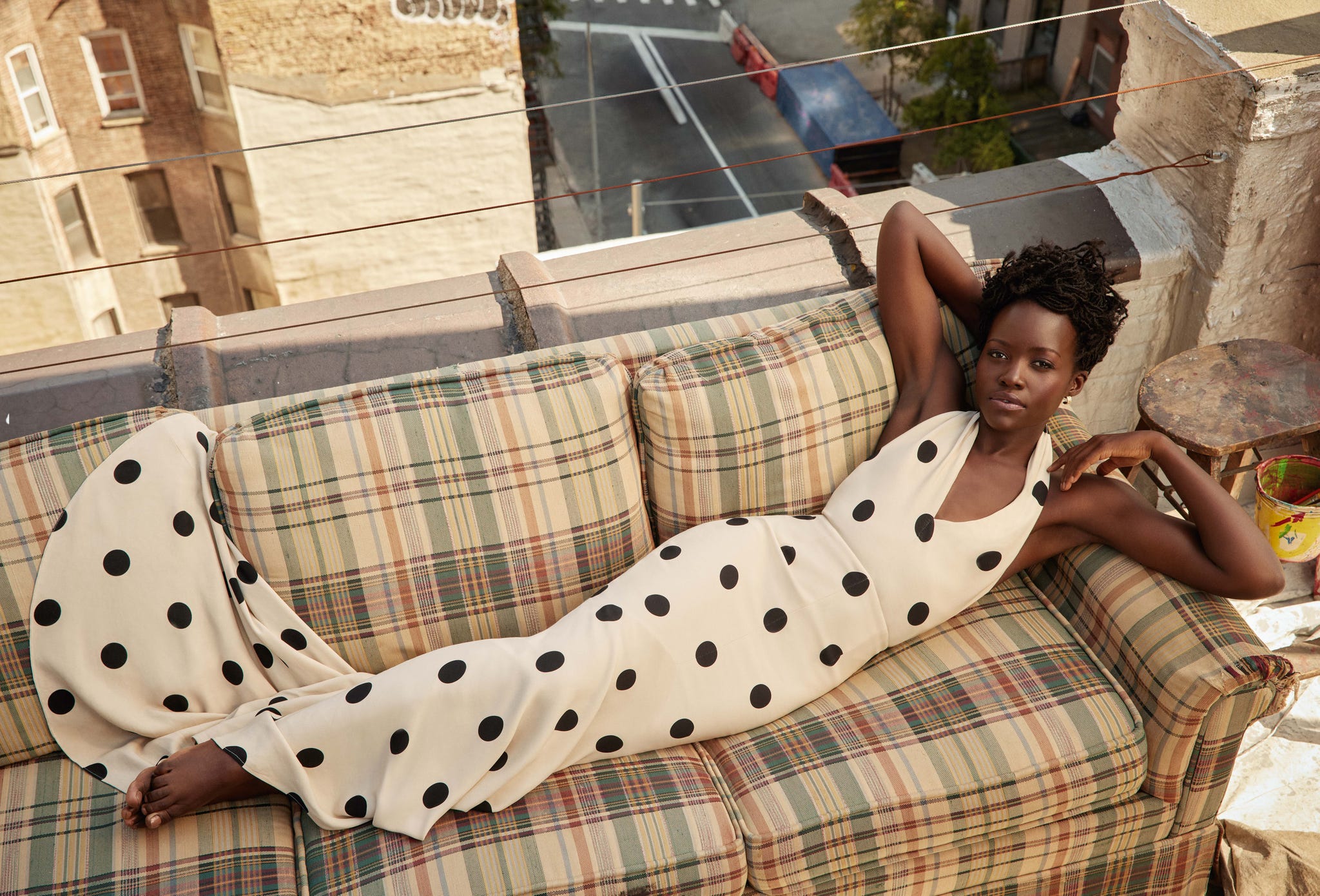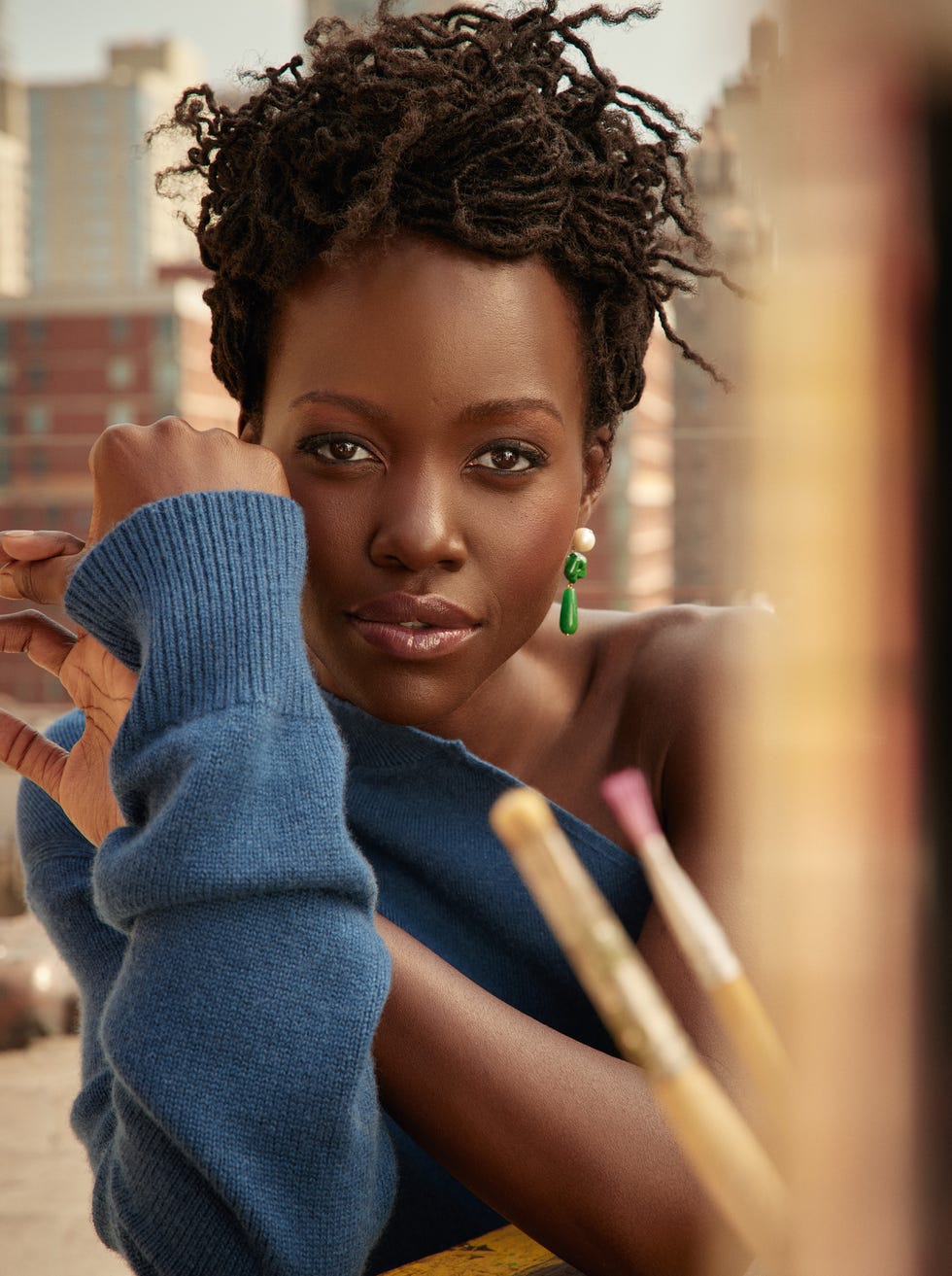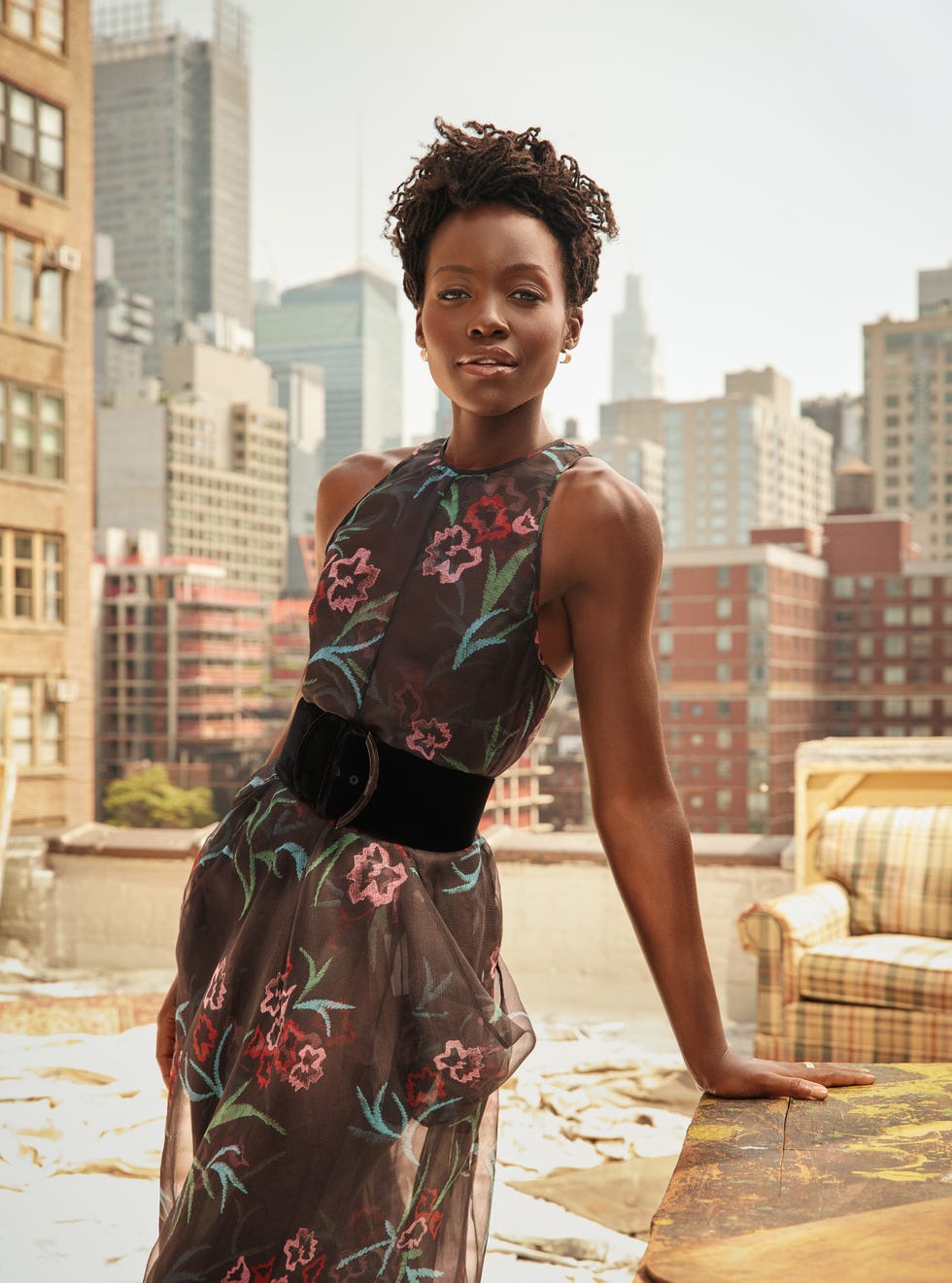Lupita Nyong’o is preparing to embrace a new era

I am staring at an empty screen where Lupita Nyong’o’s face should be. The Oscar-winning actress is in New York promoting her latest film but all I can hear is the sound of rummaging while she searches for something just out of reach. “Look!” she exclaims, appearing once more on our Zoom call hugging a cat-shaped cushion with a photo of a reclining ginger moggy on it. “It’s Yoyo!”
Yoyo is the name of her actual pet, a rescue tom whom Nyong’o adopted last year after a particularly heart-wrenching breakup. She now has eyes for no one else. “My love for my cat is singular. If I’m ever so lucky to be in a romantic relationship again, it’ll be because of him,” she says. “I was ready to shut that door and lock it and bolt it. He has ensured that my heart remains open.” Nyong’o professes all this while affectionately nuzzling the cushion. Someone made me this little pillow and at first, I thought, ‘what an odd gift’. But then as I was packing, I realised it means I get to take Yoyo with me.” She is smiling like, if you’ll excuse the pun, the cat who got the cream.
The extraordinary thing about Nyong’o’s new romance is that she’s spent most of her life utterly terrified of four-legged felines. It was only when John Krasinski sought her out to play the lead in this summer’s prequel to his horror movie franchise A Quiet Place: Day One, in which her character has a service cat, that she was forced to face her fear. After a bout of immersive therapy, where she was obliged to stroke the animals for hours at a time, Nyong’o hasn’t looked back. “My family can’t get over it,” she laughs. “My sisters are so disturbed every time I send them a picture of Yoyo. They’re like, oh my God, our sister has been stolen.’”
Nyong’o is the first to admit that her life is almost unrecognisable from little over 12 months ago. Last October, the year she turned 40, she gave the world a rare glimpse into her private affairs by posting on Instagram about her separation from the American presenter and sports commentator Selema Masekela. “It is necessary for me to share a personal truth and publicly dissociate myself from someone I can no longer trust…” she wrote. “I find myself in a season of heartbreak because of a love suddenly and devastatingly extinguished by deception.”
In previous interviews when explaining why she decided to share her relationship status online, Nyong’o has described social media as a ‘flex zone’ where people curate their lives to show the best of themselves. To combat this manicured pretence, she wanted to be honest and open, character traits she strives to uphold in herself. Announcing her anguish so publicly also meant she didn’t have to tell people one-by-one what had happened.
Speaking now, it is clear the actress has spent a long time wondering how she was caught off guard by Masekela’s betrayal. “You go through a lot of like, ‘Why? What were the signs? Why didn’t I see them? And if I did, why didn’t I act on them?’ Also, replaying moments and thinking, ‘Oh, I felt this apprehension, and I ignored it. Why did I ignore it?’ It can get toxic to beat yourself up about a past you can’t change, but it’s also an opportunity to learn about yourself.”
She won’t be broadcasting so candidly again. “It’s hard enough to go through heartbreak privately. When the world has an image of you in relation to someone else, it prolongs the healing process because the memory is emblazoned in the public domain.”
The year before the breakup, she had moved from Brooklyn, New York, where she had lived for 11 years, to LA. A month after the relationship ended, Nyong’o adopted Yoyo. “I am in a transitional period,” she says of the upheaval. “A lot of the things that have defined my life have faded away or changed. A big move like that involves seeking a new rhythm of life, a new community, a new lifestyle.” This reset includes a house that she is in the process of redesigning in the hope that it makes her space feel more like home.
Indeed, home is a fluid concept for Lupita Nyong’o. Though her family originate from the Luo tribe in Kenya, she was born in Mexico City in 1983, the second of five siblings. Her father, Peter and her mother, Dorothy, had moved there for their safety after Nyong’o’s paternal uncle mysteriously disappeared and was never found – her family believe he was killed in order to intimidate her father, who was a vocal critic of the Kenyan government (and is now a politician in the country). While Nyong’o describes Kenya, where she grew up, as “my foundation, my ethnic background and my soul”, she has a Mexican passport and also identifies as Mexican. She now speaks fluent Spanish alongside Luo, Swahili and English.
Yet America, where she has lived for the past two decades, holds another special place in her heart: “my spirit has been formed here”. In her family’s social circles, acting wasn’t considered a real job. Nyong’o, who loved performing little skits in front of loved ones, convinced herself that her destiny was to be behind, rather than in front of, the camera. Her lightbulb moment came from Ralph Fiennes on the set of The Constant Gardener where she was working as a production assistant. He encouraged her to “do anything else” that she might be interested in, because the business of acting was particularly tough for women, saying: “Only act if you feel like your life depends on it.” (Years later, Fiennes recalled the “very moving” moment he saw Nyong’o again at a film festival. She had gone on to graduate from the Yale School of Drama, beating more than 900 other applicants to gain a place at the prestigious university, which boasts Hollywood royalty Meryl Streep as an alumna.)
Her time at Yale was filled with highs and lows; she was a student when Harvey Weinstein twice propositioned her, including once at his home where he’d asked for a massage with his young family watching a film in the next-door room. In an op-ed in the New York Times she describes the shame she felt by “joining in the conspiracy of silence that has allowed this predator to prowl for so many years.” Nyong’o vowed never to work with the producer – a potentially career-ending move – but it turned out she wouldn’t need to after Steve McQueen cast her as Patsey in his 2013 movie 12 Years a Slave. She hadn’t even graduated, and it was to be her first feature film. When she won the Oscar for Best Supporting Actress the following year, she dedicated her golden statue to “every little child… no matter where you’re from, your dreams are valid.”
Since then, the actress has been in constant demand on movie sets and magazine covers, in blockbusters and on billboards. As well as being a face of Lancôme, she has played the thousand-year-old pirate Maz Kanata in the Star Wars franchise, the fiercely proud mother of a chess-playing prodigy in Queen of Katwe, and Nakia, the warrior-woman in Black Panther. This year, alongside starring in A Quiet Place: Day One, she voices Roz, the cyborg protagonist in The Wild Robot, based on the trilogy of children’s novels by Peter Brown. It wasn’t a part she instinctively knew she wanted to take, but she’s delighted she did. “I’m a very cautious person, and with animation, it takes so long to make – so that’s a long-term relationship you are getting into,” she says. “But I love the book’s illustrations and its message – how it highlights the value of human kindness and offers a touching ode to motherhood. The film is irreverent in its humour, but also unabashedly earnest and sweet.”
Nyong’o has also written an award-winning book, Sulwe, about a little girl whose skin is “the colour of midnight”. “I love projects that speak to children because they cater to our inner child,” she says. “When we are able to do that, we’re healthier. Childhood is a time when we are most allowed to be free and imaginative, if we’re lucky.”
In Sulwe – Luo for ‘star’ – the girl of the same name is teased for her dark complexion. She tries rubbing it off, eating pale foods in the hope that it will make a difference, and praying. The young Nyong’o also looked to a higher power for the same reason. “I grew up being told God performs miracles, and I took that quite literally. So I would pray for lighter skin. And he never granted me my will,” she says in mock exasperation.
Bombarded by a world that told her pale skin was the epitome of perfection, Nyong’o spent her formative years believing that her face was an inferior hue. Then came the supermodel Alek Wek. “Her existence was radical for me,” she says. “The very fact that she was a successful model, and that people were ascribing her to the word ‘beautiful’, was revolutionary.” At first Nyong’o found this apparent turn-around hard to accept. She had grown so accustomed to being the figurative black sheep. “It was so confronting to me because I had been conditioned to reject my complexion. [Wek] was the turning point for me. I thought ‘oh, I have permission to value my complexion.’”
It is strange to think of today’s Nyong’o, a woman seemingly brimming with confidence and charisma, to be lacking in self-worth. Yet her motivation for writing her own book and speaking about her experiences is so that she can be the Alek Wek for all the young Lupitas out there.
The actress is also a touchstone for many Africans across the globe. When she first moved to the US for her undergraduate degree, she was extremely homesick. “Despite the fact that I had watched American television all my life, moving to Western Massachusetts was a shock. I found myself feeling very lonely and lost,” she remembers. One of her professors mentioned listening to the radio show This American Life: she followed suit, and found it a way to learn more about what it meant to be a citizen of the country. The idea stuck with her and this autumn she launched Mind Your Own, a podcast of stories from Africans around the world. The anecdotes are not, as she says, “the newsworthy stories that are usually calamitous and tragic and dark, but just about everyday people living their everyday lives and relating to that in such a way that we can have a better understanding of a global African identity.”
In the first few episodes the actress recalls some of her own experiences, such as the time she accidentally broke a boy’s arm, or how she felt when she started adopting an American accent to fit in: “It felt like an identity crisis. Like wearing someone else’s clothes.” She also narrates the adventures of others: the extraordinary tale of a man who dug up and stole from dead bodies to make a living and once hid from police by pretending to be a corpse in a coffin. Does she, as the first Black African woman to have won an Oscar, feel a sense of responsibility when it comes to representation of the continent? “When I think of the word responsibility, it feels burdensome,” she says. “I don’t feel burdened, but motivated and interested in expanding global understanding of African perspectives and cultures. It’s more about opportunity than responsibility.”
Nyong’o has also turned the upcoming US election into a chance to educate. While she was given a green card after winning her Academy Award, she has only recently become a citizen and is using her social media to encourage others to register. “I am a virgin voter,” she says to the camera, “and I can’t believe I get to vote for a Black woman!”
The night before our interview, Kamala Harris and Donald Trump met for the first time in a televised debate. “I’m feeling very energised by my choice,” says Nyong’o, who was watching. “I think [Kamala’s] really the only option. I’m floored by her ability to keep calm and steer the course. She was very dignified.” The actress has also poked fun at the concept of a “childless cat lady”, the phrase Trump’s running mate JD Vance used to describe some senior female Democrats. For Yoyo’s birthday Nyong’o posted photos of them both with the caption #ChildlessCatLady. Taylor Swift followed suit hours after the presidential debate with a picture of herself with her kitty Benjamin Button. “It’s a movement! I love it!” laughs Nyong’o. “The fact that what was meant as a slight has become a badge of honour. I love being a member of the childless cat ladies.”
Nyong’o is terrific company with a dry humour and an easy laugh. She also has impeccable comedic timing; I’m not surprised when she says she’d like her next role to be in a comedy. She watches Bridesmaids “over and over”. The actress seems to have fun on the red carpet too. Some of her looks, particularly the caped lipstick-red Ralph Lauren dress she wore to the 2014 Golden Globes, have been lauded as among the best of this century. “I like to dress in things that make me smile,” she says. “I’m not one to watch out for a new line. Things that make me feel effortlessly put together are my go-to.” Her style icons include Audrey Hepburn for her elegance, Elizabeth Taylor for her richer, more elaborate outfits, and Grace Jones for her boldness: “She’s not afraid to stand out.” Little wonder that she is an ambassador for both De Beers, and as of this month, Chanel.
While she’s also often comfortable in the limelight, Nyong’o describes herself as a very cautious person. Prior to taking on The Wild Robot, she spent weeks speaking to the director Chris Saunders. “Every time I’m considering a new role, I have to consult my intuition about whether or not I should go down that road. I’ve gotten it wrong sometimes. When I look back, I see I didn’t listen to my intuition because fear fogged my judgment.” With so much change happening in her life right now, I wonder if the actress is fearful of what lies ahead. “I’m not worried,” she assures me. “I have no idea who I shall be at the end of this transition, but I’m trusting in this moment. It’s interesting to sit in the questions and not know what the answers will be.”
The Wild Robot is in cinemas on 18 October. The November issue of Harper’s Bazaar, starring Lupita Nyong’o and featuring the Bazaar Art supplement, is out now.
Related
High street fashion giant to close 35 stores in just…
SelectFashion, the popular women's fashion retailer known for its affordable, trendy clothing, is set to close 35 stores within days, following a series of clo
Paris Friday: Victoria Beckham, Issey Miyake, Kenzo, and Róisín Pierce
One ranged from a gilded embassy or under the Louvre to an elegant br
Hillingdon woman adapts clothes to help neurodivergent shoppers
Ms Rule is a special educational needs coordinator at Douay Martyrs Catholic Secondary School in Hillingdon but works on her business in the evenings and at wee
British fashion creators accuse Chinese retail giant Shein of using…
British fashion is under threat from artificial intelligence that can identify popular products and flood the market with cheap copies, designers have warned.Fu
